Unit 5 Let’s celebrate Comic strip & Welcome to the unit课件(共21张PPT) 牛津译林版英语七年级上册
文档属性
| 名称 | Unit 5 Let’s celebrate Comic strip & Welcome to the unit课件(共21张PPT) 牛津译林版英语七年级上册 | 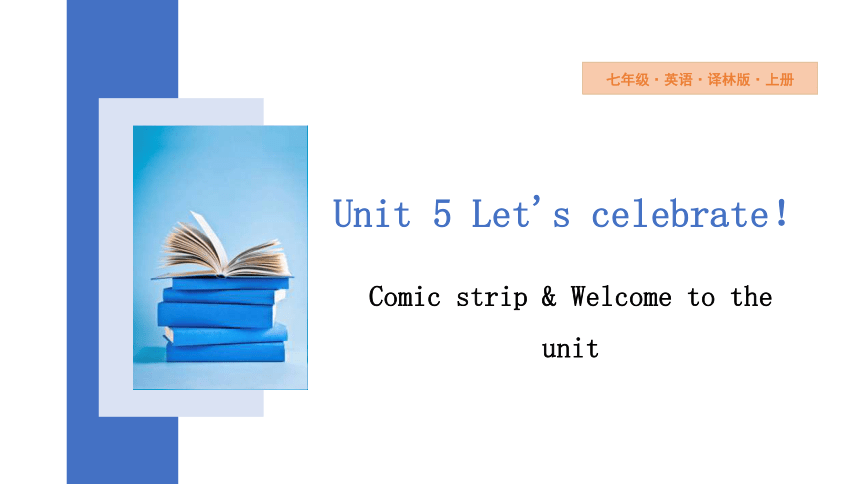 | |
| 格式 | pptx | ||
| 文件大小 | 674.2KB | ||
| 资源类型 | 教案 | ||
| 版本资源 | 牛津译林版 | ||
| 科目 | 英语 | ||
| 更新时间 | 2024-01-11 09:53:51 | ||
图片预览

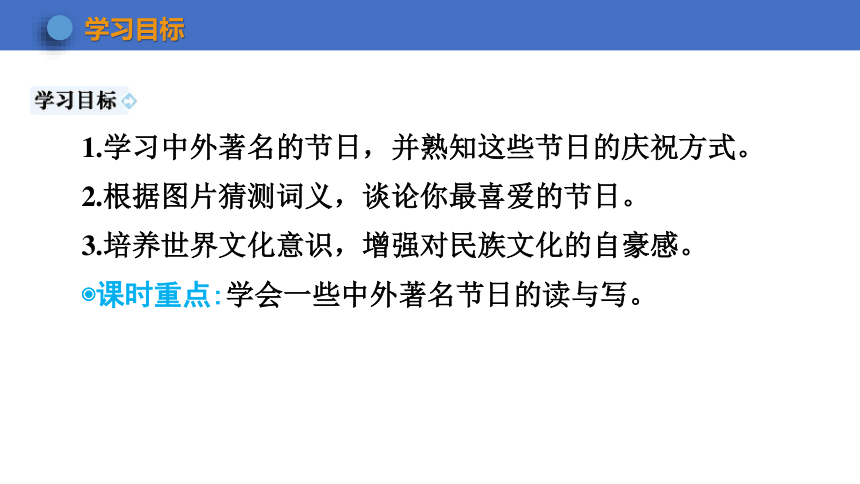
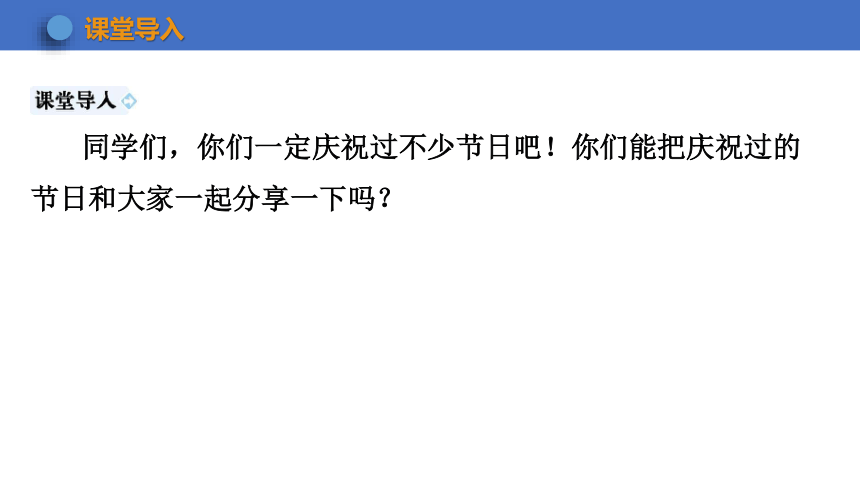
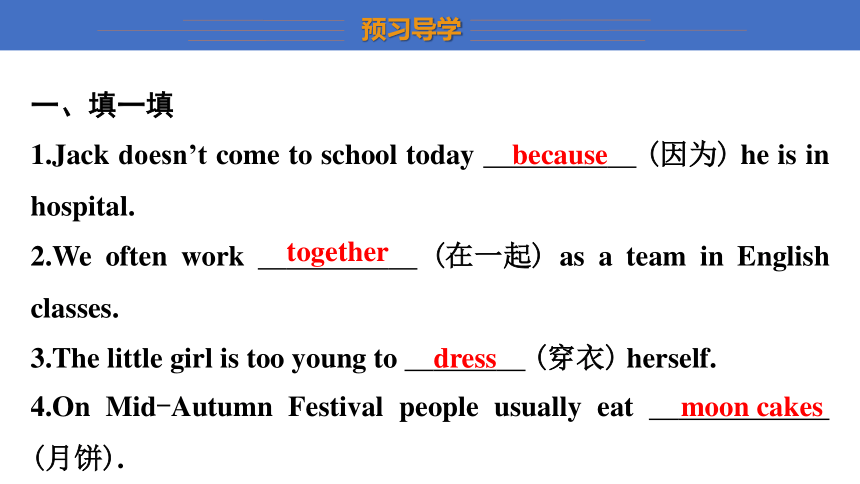
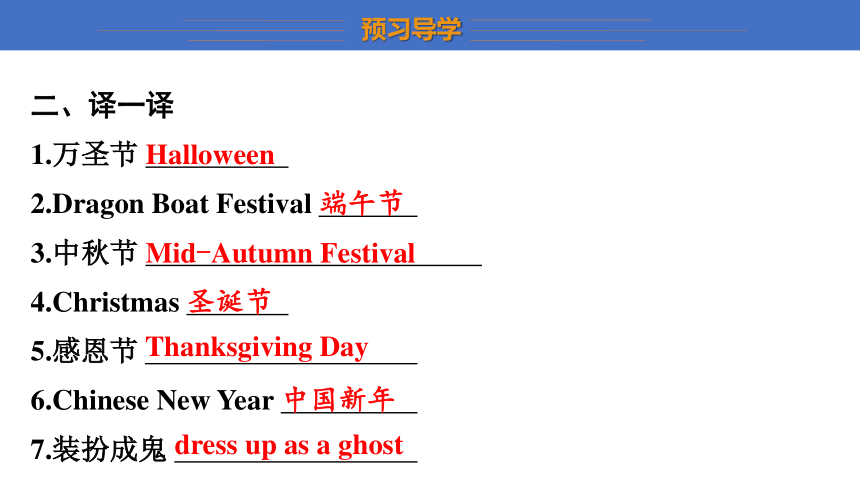
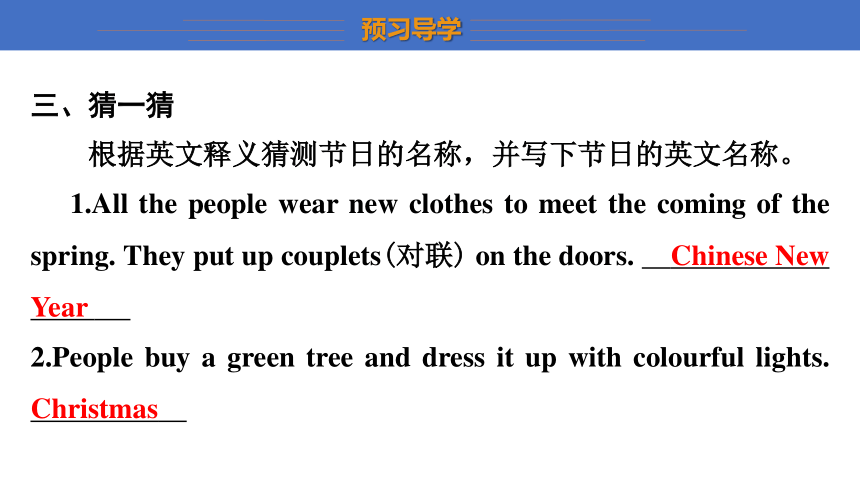

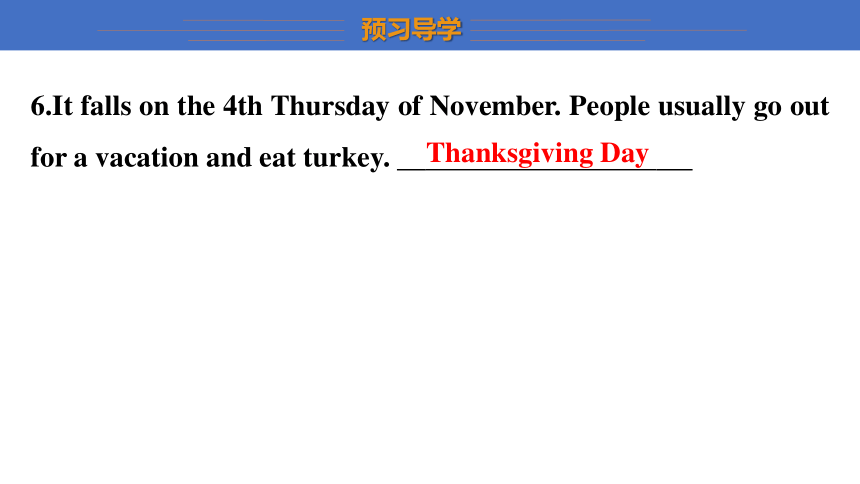
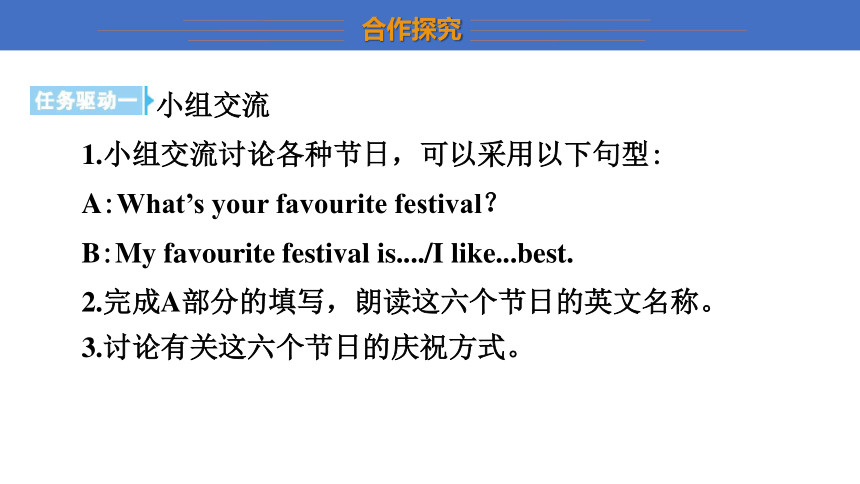
文档简介
(共21张PPT)
七年级·英语·译林版·上册
Unit 5 Let's celebrate!
Comic strip & Welcome to the unit
1.学习中外著名的节日,并熟知这些节日的庆祝方式。
2.根据图片猜测词义,谈论你最喜爱的节日。
3.培养世界文化意识,增强对民族文化的自豪感。
课时重点:学会一些中外著名节日的读与写。
同学们,你们一定庆祝过不少节日吧!你们能把庆祝过的节日和大家一起分享一下吗?
一、填一填
1.Jack doesn’t come to school today because (因为) he is in hospital.
2.We often work together (在一起) as a team in English classes.
3.The little girl is too young to dress (穿衣) herself.
because
together
dress
4.On Mid-Autumn Festival people usually eat moon cakes (月饼).
moon cakes
二、译一译
1.万圣节 Halloween
2.Dragon Boat Festival 端午节
3.中秋节 Mid-Autumn Festival
4.Christmas 圣诞节
5.感恩节 Thanksgiving Day
6.Chinese New Year 中国新年
7.装扮成鬼 dress up as a ghost
Halloween
端午节
Mid-Autumn Festival
圣诞节
Thanksgiving Day
中国新年
dress up as a ghost
三、猜一猜
根据英文释义猜测节日的名称,并写下节日的英文名称。
1.All the people wear new clothes to meet the coming of the spring. They put up couplets(对联) on the doors. Chinese New Year
2.People buy a green tree and dress it up with colourful lights. Christmas
Chinese New
Year
Christmas
3.How delicious! The cakes are round like the moon in the sky. Mid-Autumn Festival
4.How horrible! It looks like a ghost. Look at its big teeth and the strange eyes. Halloween
5.Which boat will be the first? It’s difficult to tell. Dragon Boat Festival
Mid-Autumn Festival
Halloween
Dragon
Boat Festival
6.It falls on the 4th Thursday of November. People usually go out for a vacation and eat turkey. Thanksgiving Day
Thanksgiving Day
小组交流
1.小组交流讨论各种节日,可以采用以下句型:
A:What’s your favourite festival?
B:My favourite festival is..../I like...best.
2.完成A部分的填写,朗读这六个节日的英文名称。
3.讨论有关这六个节日的庆祝方式。
听力活动
1.呈现以下问题,构架对话内容。
(1)What is your favourite festival?
(2)Why do you like it?
(3)What do you usually do on that day?
2.听对话部分的录音并回答下列问题。
(1)What is Tommy’s favourite festival?
(2)Why does he like it?
(3)What is Millie’s favourite festival?
(4)What do people do to celebrate the day?
3.分角色朗读对话。
4.根据自己的实际情况编写对话,两人一组进行表演。
Which is your favourite festival? =Which festival do you like best?你最喜爱的节日是哪一个?
角色扮演
1.小组合作交流讨论漫画, 学习有关万圣节的知识。
2.听录音回答问题。
(1)What does Hobo dress up as at first?
(2)What does he dress up as later?
3.两人一组,分角色练习对话。一人扮演Eddie,另一人扮演Hobo。邀请3~5组同学表演对话,优秀的可给予积分奖励。
●That’s not very interesting.
●interest, interesting与interested 有什么区别?
interest用作不可数名词时,意为“兴趣”;用作动词时,意为“使发生兴趣,引起……的注意”,其主语多为事或物。
interesting作形容词时,意为“有趣的”,主语通常是物,可以作表语,也可以作定语。
interested作形容词时,意为“感兴趣的;对……感兴趣”,主语通常是人,且多用于“be/get/feel/become interested in...”结构中。
用所给词的适当形式填空。
1.The game is interesting (interest). So I am interested (interest) in it.
interesting
interested
2.My little brother is very interesting (interest) and he is interested (interest) in football game.
interesting
interested
●I want to dress up as a ghost.我想扮幽灵。
dress作名词时,意为“连衣裙,女服”。
dress作动词时,意为“穿衣”。dress sb/oneself 给某人/自己穿衣。
dress up 打扮,穿上盛装, 乔装打扮。
dress up as... 乔装打扮成……
【拓展】put on 与 wear也有“穿;戴”之意。
put on意为“穿上(衣服);戴上(帽子)”,表示一个动作。人称代词宾格it 和them作宾语时要放在 put on中间。其反义词为“take off”,意为“脱下”。
wear 意为“穿衣服;戴手表,眼镜(假发)”,表示一种状态或长时间地穿或戴着……。
根据汉语提示完成句子。
1.我姐姐非常喜欢那件黄色的连衣裙。
My sister likes that yellow dress very much.
2.他的妈妈每天给他穿衣服。
His mother dresses him every day.
3.她喜欢把自己盛装打扮去参加晚会。
She likes to dress herself up to the party.
likes
yellow
dress
dresses
him
dress
herself
up
4.我爸爸今年想装扮成圣诞老人。
My father wants to dress up as Father Christmas this year.
5.看!露西正在穿她最喜爱的鞋。
Look! Lucy is putting on her favourite shoes.
wants
to
dress
up
as
putting
on
favourite
6.史密斯先生戴上帽子走出了房间。
Mr Smith put his hat on and walked out of the room.
7.今天她穿着一件绿色的连衣裙。
She is wearing a green dress today.
put
on
walked
is
wearing
dress
七年级·英语·译林版·上册
Unit 5 Let's celebrate!
Comic strip & Welcome to the unit
1.学习中外著名的节日,并熟知这些节日的庆祝方式。
2.根据图片猜测词义,谈论你最喜爱的节日。
3.培养世界文化意识,增强对民族文化的自豪感。
课时重点:学会一些中外著名节日的读与写。
同学们,你们一定庆祝过不少节日吧!你们能把庆祝过的节日和大家一起分享一下吗?
一、填一填
1.Jack doesn’t come to school today because (因为) he is in hospital.
2.We often work together (在一起) as a team in English classes.
3.The little girl is too young to dress (穿衣) herself.
because
together
dress
4.On Mid-Autumn Festival people usually eat moon cakes (月饼).
moon cakes
二、译一译
1.万圣节 Halloween
2.Dragon Boat Festival 端午节
3.中秋节 Mid-Autumn Festival
4.Christmas 圣诞节
5.感恩节 Thanksgiving Day
6.Chinese New Year 中国新年
7.装扮成鬼 dress up as a ghost
Halloween
端午节
Mid-Autumn Festival
圣诞节
Thanksgiving Day
中国新年
dress up as a ghost
三、猜一猜
根据英文释义猜测节日的名称,并写下节日的英文名称。
1.All the people wear new clothes to meet the coming of the spring. They put up couplets(对联) on the doors. Chinese New Year
2.People buy a green tree and dress it up with colourful lights. Christmas
Chinese New
Year
Christmas
3.How delicious! The cakes are round like the moon in the sky. Mid-Autumn Festival
4.How horrible! It looks like a ghost. Look at its big teeth and the strange eyes. Halloween
5.Which boat will be the first? It’s difficult to tell. Dragon Boat Festival
Mid-Autumn Festival
Halloween
Dragon
Boat Festival
6.It falls on the 4th Thursday of November. People usually go out for a vacation and eat turkey. Thanksgiving Day
Thanksgiving Day
小组交流
1.小组交流讨论各种节日,可以采用以下句型:
A:What’s your favourite festival?
B:My favourite festival is..../I like...best.
2.完成A部分的填写,朗读这六个节日的英文名称。
3.讨论有关这六个节日的庆祝方式。
听力活动
1.呈现以下问题,构架对话内容。
(1)What is your favourite festival?
(2)Why do you like it?
(3)What do you usually do on that day?
2.听对话部分的录音并回答下列问题。
(1)What is Tommy’s favourite festival?
(2)Why does he like it?
(3)What is Millie’s favourite festival?
(4)What do people do to celebrate the day?
3.分角色朗读对话。
4.根据自己的实际情况编写对话,两人一组进行表演。
Which is your favourite festival? =Which festival do you like best?你最喜爱的节日是哪一个?
角色扮演
1.小组合作交流讨论漫画, 学习有关万圣节的知识。
2.听录音回答问题。
(1)What does Hobo dress up as at first?
(2)What does he dress up as later?
3.两人一组,分角色练习对话。一人扮演Eddie,另一人扮演Hobo。邀请3~5组同学表演对话,优秀的可给予积分奖励。
●That’s not very interesting.
●interest, interesting与interested 有什么区别?
interest用作不可数名词时,意为“兴趣”;用作动词时,意为“使发生兴趣,引起……的注意”,其主语多为事或物。
interesting作形容词时,意为“有趣的”,主语通常是物,可以作表语,也可以作定语。
interested作形容词时,意为“感兴趣的;对……感兴趣”,主语通常是人,且多用于“be/get/feel/become interested in...”结构中。
用所给词的适当形式填空。
1.The game is interesting (interest). So I am interested (interest) in it.
interesting
interested
2.My little brother is very interesting (interest) and he is interested (interest) in football game.
interesting
interested
●I want to dress up as a ghost.我想扮幽灵。
dress作名词时,意为“连衣裙,女服”。
dress作动词时,意为“穿衣”。dress sb/oneself 给某人/自己穿衣。
dress up 打扮,穿上盛装, 乔装打扮。
dress up as... 乔装打扮成……
【拓展】put on 与 wear也有“穿;戴”之意。
put on意为“穿上(衣服);戴上(帽子)”,表示一个动作。人称代词宾格it 和them作宾语时要放在 put on中间。其反义词为“take off”,意为“脱下”。
wear 意为“穿衣服;戴手表,眼镜(假发)”,表示一种状态或长时间地穿或戴着……。
根据汉语提示完成句子。
1.我姐姐非常喜欢那件黄色的连衣裙。
My sister likes that yellow dress very much.
2.他的妈妈每天给他穿衣服。
His mother dresses him every day.
3.她喜欢把自己盛装打扮去参加晚会。
She likes to dress herself up to the party.
likes
yellow
dress
dresses
him
dress
herself
up
4.我爸爸今年想装扮成圣诞老人。
My father wants to dress up as Father Christmas this year.
5.看!露西正在穿她最喜爱的鞋。
Look! Lucy is putting on her favourite shoes.
wants
to
dress
up
as
putting
on
favourite
6.史密斯先生戴上帽子走出了房间。
Mr Smith put his hat on and walked out of the room.
7.今天她穿着一件绿色的连衣裙。
She is wearing a green dress today.
put
on
walked
is
wearing
dress
同课章节目录
- 预备课程
- Lesson 1 Nice to meet you !
- Lesson 2 A happy family
- Lesson 3 A nice school
- Lesson 4 You look cool !
- Lesson 5 Wonderful things
- Lesson 6 Have nice food
- Lesson 7 Enjoy our days
- Lesson 8 Let's have fun !
- Unit 1 This is me
- Unit 2 Let's play sports
- Unit 3 Welcome to our school
- Unit 4 My day
- Unit 5 Let’s celebrate
- Unit 6 Food and lifestyle
- Unit 7 Shopping
- Unit 8 Fashion
